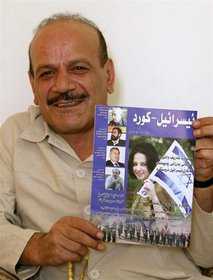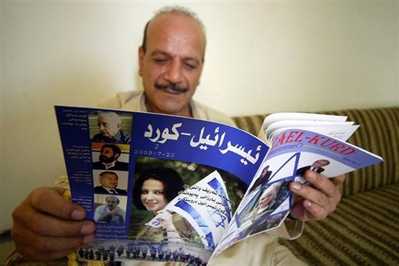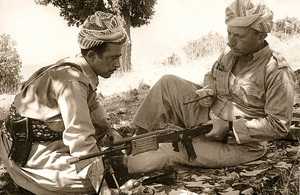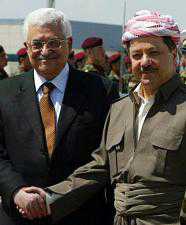Psikolojik Savaş başlıklı sunuma buradan ulaşabilirsiniz.

Download

By Dr.Kamal Said Qadir


by Abdel Hamid Zebari
ARBIL, Iraq (AFP) – A new magazine in Iraq’s Kurdistan region has caused furore among conservative Muslims with a rousing call for Jews to leave Israel — and come back to Iraq.
The magazine, “Israel-Kurd”, is the brainchild of Dawood Baghestani, the 62-year-old former chief of the autonomous northern region’s human rights commission.
The glossy, full-colour monthly in Kurdish and English has a lofty mission: to help solve the intractable Israeli-Palestinian conflict by convincing more than 150,000 Kurdish Jews living in Israel to return to Iraqi Kurdistan, Baghestani told AFP.
“The biggest reason behind the complexity of the Palestinian problem is the unjust practices of Arab regimes against the Jews — there are more than 1.5 million Jews originally from Arab countries in Israel,” Baghestani said.
“If the Jews had not been subject to an exodus, the Palestinians wouldn’t have been either,” he said, referring to the flight of 700,000 Palestinians from the newly created Jewish state in 1948 during the first Arab-Israeli war.
“If the situation in our new federal and democratic Iraq, and particularly in Kurdistan, becomes stable, then many Jews would want to return and reduce the number of Jewish settlements in Palestine.”
The latest edition of the 52-page magazine, which has a circulation of around 1,500 copies, features a woman draped in an Israeli flag on the cover.
Inside are stories about Kurdish Jewish traditions and photographs from the first half of the twentieth century, as well as arguments on how a return of Jews would help to build a wealthy and strong Kurdistan.
But many people in Iraq are not buying the argument.
“I’m suspicious. I don’t see the point of this kind of publication,” said Zana Rustayi, a representative of the Islamist Jamaa Islamiya party in the regional assembly.
“The Kurds are part of the Muslim nation, and Kurdistan is part of Iraq.”
Iraq has no relations with Israel, and the country was an implacable foe of the Jewish state under the regime of former dictator Saddam Hussein, who was overthrown by the US-led invasion in 2003.
A Sunni member of parliament in Baghdad, Mithal Alusi, was suspended from parliament and threatened with charges last year after visiting Israel for a conference. The decision was later overturned by the constitutional court.

Kurdistan does have a warmer history with the Jewish state, however. Many of the current crop of Kurdish leaders have visited Israel in past decades.
Jews lived in Kurdistan for centuries, working as traders, farmers and artisans.
But the creation of Israel and the rise of Arab nationalism in the mid-twentieth century dramatically altered the situation, spurring most of Kurdistan’s Jews to leave.
Baghestani — who has been to Israel four times, including on a clandestine trip in 1967 — denies that he works for the Israelis.
“What I am asking for is enshrined in the constitution: every Iraqi has the right to return to one’s homeland. Jews who were Iraqi citizens were subject to injustice,” he said.
“If every Arab country allowed the Jews to return, ensured their safety and gave them back their land,Palestinian refugees would be able to return to their territory because Israel would not need so much land.”
Mahmud Othman, a Kurdish Coalition MP in Baghdad, disputes this. He says that while relations with Israel may be a nice idea, such a move would not be pragmatic for a region ringed by other Muslim states.
“Kurdistan needs the Arabs. We are living in an Arab country and we are federal region within Iraq. We don’t need a relationship with (Israel), we need a relationship with Arabs, we need a relationship with Iran, we need to be close to Turkey,” Othman said.
“I haven’t heard of any Jews in Israel trying to return to Kurdistan. I think they’re better off there.”
Source: news.yahoo.com, Aug 12, 2009

Source: www.nrg.co.il, ג’קי חוגי | 10/8/2009

by Michael Rubin
Daily Star (Beirut)
July 1, 2009
On June 12, Iranians voted for a president. While the Islamic Republic may not be a democracy, its leadership has always looked to the polls to bestow popular legitimacy. Ayatollah Ahmad Janati, chairman of the Guardian Council, for example, said just two days before the election: “The enemies have always tried to question the legitimacy of the regime by trying to reduce public participation in elections … The people must blind the eyes of the enemies by vast participation in elections.” Iran’s desire for elections, however, does not extend to accepting their results. Outraged, millions took to the streets across the country, some chanting “Death to the Dictator.”
Iranians, however, may not be the only ones to take to the streets to protest election fraud this summer. On July 25, Iraqi Kurds will vote in long-delayed regional elections. For the first time, the major political figures – Kurdistan Democratic Party (KDP) leader Massoud Barzani and Patriotic Union of Kurdistan (PUK) leader, and Iraqi president, Jalal Talabani – face serious local opposition.
In the wake of Kuwait’s liberation in 1991, Iraqi Kurds rose up against Saddam Hussein’s tyrannical rule. Rather than allow Saddam’s helicopter gunships to massacre the civilian population, the United States, France, Turkey and Great Britain created a safe-haven in northern Iraq. The following winter, Saddam withdrew Iraqi officials from what would become Iraqi Kurdistan, believing he could starve the Kurds into submission. It did not work. The Kurds organized elections. Almost a million people voted. Barzani edged out Talabani, 45 to 44 percent, with smaller parties splitting the remainder. Power sharing was not always smooth: Both leaders like to command; both became addicted to power. So long as Saddam remained a threat, Kurds tolerated abuses. Since Saddam’s fall, however, impatience at the failure to reform has grown.
While the Kurdistan Regional Government could once describe itself as a democratic beacon in the region, today such depictions lack credibility. Seventeen years after its first election, Iraqi Kurdistan is at best as democratic as Egypt or Iran, and worst akin to Syria or Tunisia. Corruption is rife. Barzani uses the government budget as a family slush fund, for example donating hundreds of millions of dollars from public coffers to allow a relative to win a 2007 bid to operate an Iraq-wide cell phone company. Few profitable businesses – oil, finance, industry or trade – can operate without either silent partnership with or outright payment to the Barzani or Talabani families.
Nepotism is also rife. Barzani, for example, appointed his son to head the region’s intelligence service, the dreaded Parastin, which Amnesty International has accused of torture. While free media have become an engine for democracy in the rest of Iraq, the Kurdish security services threaten, harass, and in some cases even kill independent journalists.
The people of Iraqi Kurdistan say they have had enough. Noshirwan Mustafa, Talabani’s one-time deputy, has joined the former KDP secretary general to form a rival election list. Two prominent Islamic parties have joined with secular counterparts to create an additional reform list. Both challenging lists are polling well.
Barzani and Talabani are worried. Rather than allow open election lists as in the rest of Iraq, the Kurdish leaders insist that party lists be closed, a way of preventing voter repulsion at examples of nepotism or those known to be abusive of power. As the rival lists, the Change List and the Service and Reform List, have gained traction, the Kurdish security forces have threatened and roughed up opposition candidates. Party officials have told apolitical bureaucrats that they will lose their jobs if they do not support Barzani and Talabani. There is widespread belief that KDP and PUK officials have compromised the Independent Higher Election Commission’s regional offices after KDP security forces visited and, in some cases, arrested opposition candidates within hours of their filing theoretically confidential candidacy papers.
As has the Islamic Republic’s leaders, Iraqi Kurdistan’s leaders speak of democracy, but have become drunk with power, and disdainful of public accountability. As in Iran, Kurdistan Regional Government officials have amassed vast fortunes inconsistent with salaries. Today, ordinary Kurds refer to Barzani, his nephew, and his sons, as “little Saddams.” Actually, “little Rafsanjanis” might be as accurate. As in Iran, Iraqi Kurdish officials have also worked to constrain independent monitoring which might report on intimidation and interference before election day.
As a consequence of all this, it appears that the Iraqi Kurdish people seek change. What remains to be seen, however, is if Iraqi Kurds will stand up for freedom and liberty as have the Iranian protestors, and if the Iraqi Kurdish security forces will, like their Iranian counterparts, use the point of a gun and midnight roundups to disenfranchise a deserving people.
Michael Rubin, a senior editor of the Middle East Quarterly, is a resident scholar at the American Enterprise Institute and a senior lecturer at the Naval Postgraduate School.


ARBIL, Iraq (AFP) — Palestinian president Mahmud Abbas on Monday met Kurdish regional government leader Massud Barzani in a visit aimed at cementing ties between the two largest stateless peoples in the Middle East. (!!)
“We did not need any invitation to visit this brotherly nation and we have felt for a long time that the doors were always open to us without even needing to make an appointment,” Abbas said at a joint news conference.
“The honourable president Barzani was not even told of our visit until 24 hours beforehand and he said ‘Ahlan wa Sahlan,’” Abbas said, using the common Arabic form of greeting.
Barzani for his part praised Abbas for being the first “president” to visit the autonomous region in northern Iraq.
“We are used to our Palestinian brothers always being in the forefront of aiding our people in the past and present,” he said. “This visit will cement the relationship between our two peoples with their similar suffering.
“Just as he is the first president to visit the region we expect and we hope that the Palestinian consulate will be the first consulate to open in Arbil.”
Abbas is the president of the Palestinian Authority, an entity created by the 1993 Oslo autonomy accords that governs parts of the Israeli-occupied West Bank.
Abbas’s forces were driven out of the Gaza Strip by the Islamist Hamas movement in June 2007.
Barzani is the president of the autonomous Kurdish region of northern Iraq. The Kurds, numbering between 25 and 35 million people, are concentrated in a region overlapping Turkey, Iran, Iraq, and Syria and have never had a state.
Abbas’s trip came one week after he held talks with Iraqi President Jalal Talabani, a Kurd, in Baghdad, in what was the first visit to Iraq by a Palestinian leader since the 2003-US led invasion that ousted Saddam Hussein.
Saddam was a vocal patron of the Palestinians under Abbas’s predecessor Yasser Arafat but ruled the Kurds with an iron fist, brutally crushing Kurdish rebellions in the 1980s and killing an estimated 182,000 people.
Copyright © 2009 AFP. All rights reserved
Source: www.google.com/hostednews/afp, 13 April 2009

By Wayne Madsen
Online Journal Contributing Writer
Jan 30, 2009, 00:20
WMR) — Israeli expansionists, their intentions to take full control of the West Bank and the Gaza Strip and permanently keep the Golan Heights of Syria and expand into southern Lebanon already well known, also have their eyes on parts of Iraq considered part of a biblical “Greater Israel.”
Israel reportedly has plans to relocate thousands of Kurdish Jews from Israel, including expatriates from Kurdish Iran, to the Iraqi cities of Mosul and Nineveh under the guise of religious pilgrimages to ancient Jewish religious shrines. According to Kurdish sources, the Israelis are secretly working with the Kurdistan Regional Government (KRG) to carry out the integration of Kurdish and other Jews into areas of Iraq under control of the KRG.
Kurdish, Iraqi Sunni Muslims, and Turkmen have noted that Kurdish Israelis began to buy land in Iraqi Kurdistan, after the U.S. invasion in 2003, that is considered historical Jewish “property.”
The Israelis are particularly interested in the shrine of the Jewish prophet Nahum in al Qush, the prophet Jonah in Mosul, and the tomb of the prophet Daniel in Kirkuk. Israelis are also trying to claim Jewish “properties” outside of the Kurdish region, including the shrine of Ezekiel in the village of al-Kifl in Babel Province near Najaf and the tomb of Ezra in al-Uzayr in Misan Province, near Basra, both in southern Iraq’s Shi’a-dominated territory. Israeli expansionists consider these shrines and tombs as much a part of “Greater Israel” as Jerusalem and the West Bank, which they call “Judea and Samaria.”
Kurdish and Iraqi sources report that Israel’s Mossad is working hand-in-hand with Israeli companies and “tourists” to stake a claim to the Jewish “properties” of Israel in Iraq. The Mossad has already been heavily involved in training the Kurdish Pesha Merga military forces.
Reportedly assisting the Israelis are foreign mercenaries paid for by U.S. Christian evangelical circles that support the concept of “Christian Zionism.”
Iraqi nationalists charge that the Israeli expansion into Iraq is supported by both major Kurdish factions, including the Patriotic Union of Kurdistan headed by Iraq’s nominal President Jalal Talabani. Talabani’s son, Qubad Talabani, serves as the KRG’s representative in Washington, where he lives with his wife Sherri Kraham, who is Jewish.
Also supporting the Israeli land acquisition activities is the Kurdistan Democratic Party, headed by Massoud Barzani, the president of the KRG. One of Barzani’s five sons, Binjirfan Barzani, is reportedly heavily involved with the Israelis.
The Israelis and their Christian Zionist supporters enter Iraq not through Baghdad but through Turkey. In order to depopulate residents of lands the Israelis claim, Mossad operatives and Christian Zionist mercenaries are staging terrorist attacks against Chaldean Christians, particularly in Nineveh, Irbil, al-Hamdaniya, Bartalah, Talasqaf, Batnayah, Bashiqah, Elkosheven, Uqrah, and Mosul.
These attacks by the Israelis and their allies are usually reported as being the responsibility of “Al Qaeda” and other Islamic “jihadists.”
The ultimate aim of the Israelis is to depopulate the Christian population in and around Mosul and claim the land as biblical Jewish land that is part of “Greater Israel.” The Israeli/Christian Zionist operation is a replay of the depopulation of the Palestinians in the British mandate of Palestine after World War II.
In June 2003, a delegation of Israelis visited Mosul and said that it was Israel’s intentions, with the assistance of Barzani, to establish Israeli control of the shrine of Jonah in Mosul and the shrine of Nahum in the Mosul plains. The Israelis said Israeli and Iranian Jewish pilgrims would travel via Turkey to the area of Mosul and take over lands where Iraqi Christians lived.
Previously published in the Wayne Madsen Report.
Copyright © 2008 WayneMadenReport.com
Wayne Madsen is a Washington, DC-based investigative journalist and nationally-distributed columnist. He is the editor and publisher of the Wayne Madsen Report (subscription required).
Copyright © 1998-2007 Online Journal
Source: Online Journal, Jan 30, 2009
